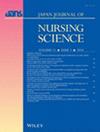Effects of a Tanzanian prenatal group education program about preeclampsia/eclampsia: A quasi-experimental study
Abstract
Aim
This study examined the effects of a prenatal group education program in Tanzania which was focused on preeclampsia/eclampsia according to knowledge, behavioral intention, Pregnancy-Related Empowerment Scale, satisfaction, and the incidence of preeclampsia.
Methods
The study was conducted in two district hospitals in Tanzania and used a facility-based pre-post quasi-experimental design with concurrent control. The prenatal group education program was developed to focus on preeclampsia/eclampsia and consisted of lectures, discussions, and review sessions directed at participatory group education. The intervention group participated in a midwife-facilitated prenatal group education program, whereas the control group received routine care. Data were collected through questionnaires before the intervention and 1 month later. A descriptive analysis of the data was performed.
Results
The study analyzed 95 pregnant women within an intervention group (n = 48) and control group (n = 47). At the 1-month post-test, statistically significant differences were observed between the intervention and control groups in the knowledge score (mean = 3.8, SD = 3.6 vs. mean = −0.8, SD = 3.1, p < .001) and satisfaction score (mean = 4.9 vs. mean = 4.6, p = .032). Between the two groups, there were no significant differences in the scores of behavioral intention, Pregnancy-Related Empowerment Scale, and the incidence of preeclampsia.
Conclusion
The prenatal group education program increased the knowledge level regarding preeclampsia and gave higher satisfaction among pregnant women. Knowledge was retained for at least 1 month. Continuity in implementation of this program is recommended.

 求助内容:
求助内容: 应助结果提醒方式:
应助结果提醒方式:


